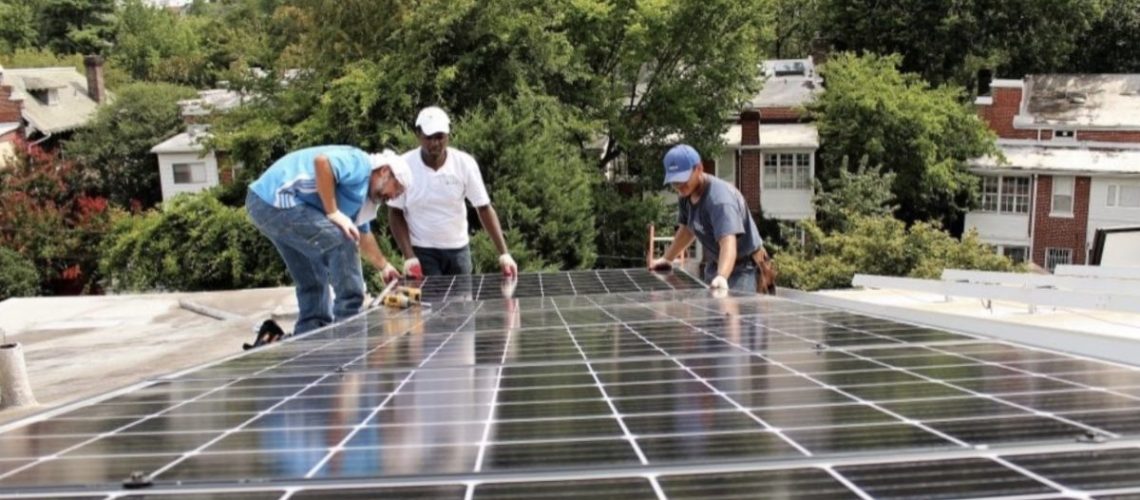The Biden-Harris administration launches low-income energy assistance program and funding to support careers in solar energy in underserved areas.
The Department of Energy (DOE) announced new initiatives to lower electricity bills for low-income residents and create good-paying jobs in the domestic solar industry. In collaboration with the US Department of Health & Human Services (HHS), a pilot of the Community Solar Subscription Platform will be launched in Colorado, Illinois, New Jersey, New Mexico, New York, and Washington, D.C. The goal is to lower electricity bills through the Low-Income Home Energy Assistance Program (LIHEAP) and other low-income assistance programs.
DOE also announced $10 million from President Biden’s Bipartisan Infrastructure Law to jump-start solar energy careers in underserved communities, which also supports the President’s goal of reaching a carbon-free electricity sector by 2035.
“Every American community, especially those that face disproportionately higher energy burdens, deserves the economic and health benefits that come with increased access to affordable clean energy,” said US Secretary of Energy Jennifer M. Granholm. “This is why DOE is working across the federal government to open up community solar that will rapidly lower electricity bills for households that need it most and create good paying jobs in every pocket of America.”
Community solar enables multiple customers to benefit from a shared solar energy system, and can reduce electricity costs. The DOE’s community solar target is to power 5 million homes and provide 20% savings on a subscriber’s energy bills, up from 10% on average today.
The Community Solar Subscription Platform is designed to connect community solar projects with verified cost savings to households participating in government-run assistance programs like LIHEAP. DOE has prioritized working with states that have existing programs that support low-income community solar development so that, if successful, participants will see significant electricity bill savings of approximately 20% in Illinois, New Jersey, New York, and New Mexico and 50% in Washington, D.C. and Colorado.
“This innovative and exciting project helps lower electricity bills, save people money through expanded and streamlined access to affordable community solar subscriptions. This initiative will save Coloradans millions on electricity bills every year, reducing energy burdens across the state,” said Colorado Governor Jared Polis said. “That’s money better spent on groceries, on rent, or on taking the family out for fun. We are so thrilled to support this effort to save people money and accelerate Colorado’s pathway to 100% renewable energy.”
DOE’s National Community Solar Partnership, HHS, National Renewable Energy Laboratory, Lawrence Berkeley National Laboratory, National Energy Assistance Directors Association, and the National Association of State Energy Officials are collaborating on the Community Solar Subscription Platform. DOE also issued a Request for Information to obtain feedback on the structure of the platform from community-based organizations, community solar subscription managers and developers, state and local governments, researchers, LIHEAP implementation organizations, and others. Responses are due by August 31 at 5 p.m. ET.
Solar jobs in underserved communities
Through the bipartisan infrastructure law, the Biden-Harris administration has invested $10 million to ensure that the future solar workforce is equitable, inclusive, and benefits people in underserved communities. According to estimates in DOE’s Solar Futures Study, the industry will need to create hundreds of thousands of good-quality jobs to achieve decarbonization goals. The DOE’s Advancing Equity through Workforce Partnerships program plans to fund projects that support new workforce programs that recruit, train, and retain an inclusive workforce.
DOE is also launching the Sunny Awards for Equitable Community Solar, a new awards program that will recognize best practices in community solar that increase equitable access and ensure benefits go to subscribers and their communities. Up to five finalists can win a Sunny Award and prizes of $10,000 per team.
“Deploying community solar is a vital move to protect both our climate and the millions of households most vulnerable to utility shutoffs and dirty energy price spikes,” said Jean Su, Energy Justice program director at the Center for Biological Diversity. “As deadly heatwaves shatter records, this move signals that Biden is taking the climate emergency seriously, but he must go further, and fast. By declaring a climate emergency, Biden can unleash his full suite of executive powers, draw down deadly fossil fuels, and show the world he’s ready to fight the climate catastrophe head-on.”
The Center for Biological Diversity tracks the utility shutoffs crisis resulting from economic and climate pressures. The Center’s recent report with Bailout Watch reveals that over 3.5 million households in only 33 states were shut off from power from 2020-2021 due to the inability to pay and urges community and rooftop solar as solutions to the shutoffs crisis.



